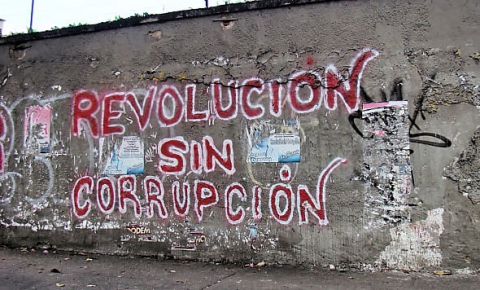We, the Venezuelan people, find ourselves in a particular limbo: over a month after a failed military insurrection, we are waiting to see if security forces will finally act towards a democratic change while we evaluate –between the anger, skepticism, even optimism– the attempt at dialogue that was carried out in Norway.
Most Venezuelans have no decision power over military strategies or dialogues between elites. Neither do we know the true intentions of those characters involved, nor could we explain why these events happen when they do. Common sense indicates that as many citizens as possible should have some sort of agency (capacity of action or influence) during a process of political change as the one we are living in Venezuela. Historical experience shows that some popular movements have managed to push democratic transitions towards wider and more inclusive goals than the ones that could have been achieved through exclusive action of the elites.
Political change can include elements of force, either internal or external. It would be internal force if state security bodies acted individually, aligned with the National Assembly or another figure. External force would be given by the intervention of a group of countries, ruled by the international law which is committed to the Responsibility to Protect. Even if change were originated by an act of force, a democratic transition could be consolidated effectively only by a political movement where diverse sectors coexist, built from the foundations of civil society –including the political parties– and that utilizes non-violent methods. In a successful negotiation, a possible construction of peace would not be possible without dialogue and political understanding permeating all levels and sectors of society.
Not repeating the same mistakes from previous negotiations or performances of the military will depend on the citizen movement to know how to push those scenarios towards respect of human rights and democracy; it will depend on the movement to make movements to open up opportunities where there appears to be none.
It would be a mistake to respond with logic of confrontation in the case of a potential military maneuver in which the Armed Forces sided with the only remaining democratic institution in the country, the National Assembly. It seems more rational to do precisely the contrary: in a military action, civilians should not behave how the military would, but we should use our own tools and logic. Words, human connection, and organization: the network that persists and insists on saving lives, and making democracy. If there existed a next military scenario, civil act must be massive, organized, and non-violent to counteract the possible violence from the Armed Forces’ political actions.
A dialogue process should neither betray the trust of citizens nor stop the organization and mobilization processes. The mistake in previous opportunities has been to negotiate while ignoring that mobilization and dialogue should have a strategic sequence. Without the support of the citizen movement, there will be no control over those agreements, and there would be no one to defend them in case they were violated. While mobilization adjusts the balance of power to sit down to negotiate as equals, dialogue enables a political solution between the parties. Each instance has a role.
Negotiation and dialogue have a very important role: the foundation for the political solution without which we could never be able to overcome the Venezuelan conflict. Thinking that the military does not fulfill a role would be trying to cover the sun with one finger. But the citizens in movement are the ones who decide in the end whether to accept or discard the results of the processes –of force or not– according to their use for the collective purpose: to build democracy and democratic institutions. Citizens in movement do not act with an individual epic action, but through building alternatives, mobilizing to defend the rights, and interweaving to strengthen themselves against any state or parastatal tyranny.
It is the citizenship in movement the one that has denounced the Complex Humanitarian Emergency since 2016, yet the international community not reacting on time; the one that has risen three times within five years in cycles of multitudinous protests; the one that gets up again and again in the face of repression; the one that connects the diaspora with the most needy; the one that creates solidarity networks not only to solve the day to day, but also to allow community autonomy; the one that documents, denounces, and diffuses human rights violations; the one that learns to identify fake news and to not spread it; the one that resists against the insistence of the power in dehumanizing the other and normalizing violence. We have a legacy. Let’s keep moving.
[1] “Whatever the mix of responses, the popular upsurge performs the crucial role of pushing the transition further tan it would otherwise have gone”. (Transitions from Authoritarian rule: Prospects for Democracy”. O’Donnel & Schmitter 1986, 56)
Researcher and activist of @LaboCiudadano, a group of activists dedicated to the action-reflection around human rights and non-violence.
Twitter/Instagram: @isapicon_
Email: isapiconb@gmail.com




